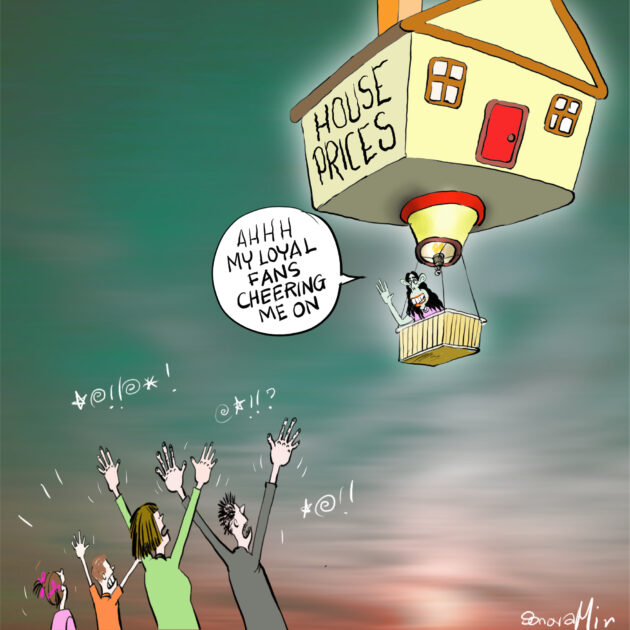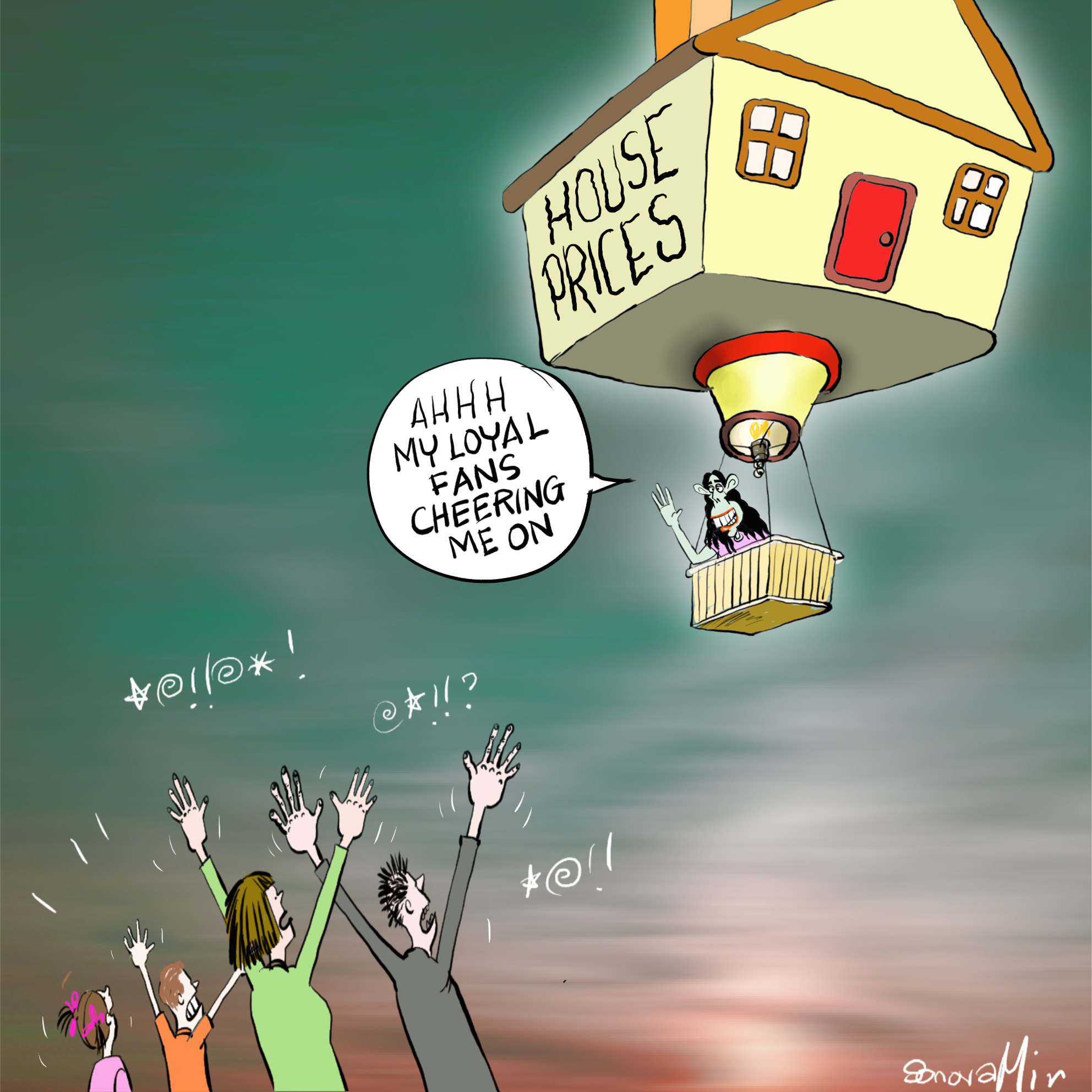Alwyn Poole
1) The New Zealand “housing market” as a construct is a myth that is only useful for banks, real estate agents and NZ Herald’s “One Roof” to create FOMO.
- For those unable to afford to rent or buy – through circumstances or choice – they are not in a market at all as they are not ‘buyers’ and need provision. This should be the government’s main priority – to help those who cannot currently help themselves. The data on who these people are and how they got there should be detailed. Then interventions (where possible) to help them up to provide for themselves become the next step.
- There is a market for basic housing – mainly rental – where, for instance, a family is starting out or students/young graduates need flats. Or it could be that an individual/family is on a relatively low long-term wage and saving is genuinely difficult. Government interventions here should take into account family income for students and be means tested. Tiny house communities or well-designed hub accommodation with central common areas, kitchen and bathrooms (e.g. university dorms) also have a place but can be privately provided.

The launch of the Social Bite Homeless Tiny House Village in Edinburgh UK May 17th 2018. Photo credit: Cavajunky
- Then there is the market that is for wealth and aspects of security. This is the market most buyers are interested in and is why the frequent articles of tiny house providers and pre-fabs promising to “solve the housing crises” miss the mark so badly. This market generally involves land (although apartments come into it) and location. Other influences clearly include school zoning, closeness to work, and perceived prospects for appreciation.
- There are, or course, further breakdowns to indicate that there is no generalised housing market in that each region, town, suburb and city differs. Even the price to income ratio differs strongly between regions. There is also a good case for seeing any house that is for sale as a market in and of itself as it has its own features to generate, or not, demand and will find a unique price.
- According to Statistics NZ there were 1,771,300 NZ households at the end of June 2020. Of those 62% owned their own home, 34%, rented their homes and 4% lived in free accommodation, such as that provided by a relative. That is not the housing market! In June 26,265 houses sold. That is the supply side of the market and it represents approximately 1.5% of the housing stock.
To calm the farm and be more accurate Grant Robertson would do well to break down his approach and fully inform the public on the four (plus) markets and differentiate his approach. Interference on the open market should be minimal and only creates failures and distortions – e.g. Kiwibuild. At present many people are cash and equity rich and have no incentives to save and little ability to travel. The red tape and hassle of SME’s is demoralising and there are few incentives for broad investment in business. What is left? Only buying and improving houses or hiding cash under the mattress.
There is an economic irrationality to having a freehold house. If people understand, that is fine, but equity is, financially, much more important than owning something outright. A million dollars sitting in a house is dead money and costs you, at today’s rates, $30k per annum. If you want to develop your wealth this should be understood.
2) The politics and gamesmanship of Real Estate.
In brief:
– 62% of NZers are homeowners (most co-owning with a bank) and at least another 18% would aspire to be. This is a powerful political voting block who do not want to see house prices come down, a capital gains tax, or the ridiculous wealth tax proposals.
- As the Wolf of Wall St said about his young self: “I was aware of the importance of supply and demand even then. I knew that if I wanted to have a successful auction I’d need to have lots of bidders.” With around 2% of housing stock for sale the Real Estate companies are doing a great job with a complicit media to get bidders in.
- As Gordon Gecko said: “Greed, for lack of a better word, is good.”
- John Clarke knew the tactics way back:
- The Greens, including the highly uninformed Chloe Swarbrick, try and promote intergenerational warfare and, unfortunately, sometimes David Seymour chips in. It is a very poor understanding of the contribution of our over sixties.
- The major Real Estate companies are masters of creating FOMO and are very much in cahoots with the New Zealand Herald who are so desperate for income and clicks through the “One Roof” section (e.g. ‘Another million buys you a house that’s ten times better’). Even Adrian Orr has begun calling them out. It is exploitation for profit near its worst.
- Tony Alexander is the only one I have noticed trying to help people calm down.
- From 7:40mins into this clip John Key (chair of the ANZ) gives the most spurious and vested interest comment of buying versus renting I have ever seen. Although Shamubeel “Rent for Life – Except Me” Eaqub gets close in the reverse direction. See if you can work out all the ways Key was wrong – and I am sure he knew it.
- People need to understand the effect that having the student loan scheme has created for young people. Students need to absolutely minimise how much they borrow/spend or they will simply be older and older when they get debt free and can start to save for a house deposit.
- No one should stay in a bad/violent marriage but for most couples marriages are a work-on project, and financially (and – yes – I do believe in romance) staying together is miles ahead of breaking up. How much of the housing demand in NZ is because both parents need a three-bedroom home for their week or weekends with the kids?
3) Our Experience
My wife and I married young and decided to have our three children in our twenties. Materially it meant not having much but, like some One Day International cricket strategies, we felt we could catch up at the end and chose to have experiences above possessions. Only one of us worked full time while our children were under five and throughout their primary schooling someone was always home at 3pm to greet and care for them. The first child’s initial bedroom was in the wardrobe of our one bedroom flat. We lived in 14 homes in 4 cities before we bought our home in Russell when we had both hit 50 years old and our children had grown up – with degrees, etc.
In our extended families, my wife and I were the first people to get degrees. My grandmother had 11 children and my parents had very little to give except love. My wife’s father came to New Zealand from Holland in 1952.
We made sure that when we rented – until three years ago – that we were very good tenants. We have always paid our credit card every month and never bought outside of savings. Our children did not have phones until 16 and I still don’t have one. They also never had a PlayStation but had heaps of books and I read to them every night on the couch for at least 30 minutes. Sometimes old school is good school.
We almost always had one or two international students living with us to help pay our rent and other bills. Great experience for our children too and some have become lifelong friends and hosted us when we have travelled.
When we chose to buy, we chose a house in Russell with no plans to ever sell. The “property ladder” is another myth – it can often be better to buy once and buy well. When we are working in Auckland we stay in two little rooms downstairs at the house that my son and daughter in law rent. I call it the dungeon but it works – saving about $25k per year against maintaining our own Auckland flat. The house in Russell has three units, apart from ours, to host friends & family and AirBnB for income.
We have always had only one personal car. Bought second hand/TradeMe everything – although I did buy a new road cycle once but it was crap and I had buyer’s regret. We ate at restaurants on special occasions, grew our own vegetables for ten years and valued doing over having.
4) What should young people do today?
- Stop complaining. This remains the best time ever in the history of the world to grow up.
- Dearly love your parents and grandparents.
- Work hard at school and get great qualifications (a degree, on average, earns you $1.5 million above not having one).
- Don’t smoke and, if you drink, drink moderately. I calculated that my parents spent, in 2020 money, at least $400k on cigarettes and I remain surprised that the sherry industry still exists after my father died.
- Don’t give in to FOMO and other forms of financial worry. As someone much wiser than me said, “who of you, by worrying, can add a single year to your life?” Have a plan and stick to it. For most people their income rises through their earning lifetime. We worked out that for many years we could save much more by renting than buying a house. People will say that rent is dead money but, the truth is, so is interest.
– Take thoughtful risks and do not be afraid of going into your own business.
- Think carefully of where you want to live and the experiences that you want you and your family to have. Many things of value are free – we have spent many, many great days at the beach. As one wise person said to me; “very few people will lie on their death bed and say that they wished they has spent more time in the office and away from family and friends”.
- Try and live close to your work.
- Be financially savvy and save to buy the things you want and avoid all kinds of interest payments and penalty payments. Don’t buy brand new cars.
- OEs are important but then don’t come back to New Zealand with nothing to your name and expect that the country owes you a living. Come back and aim to contribute positively and start from there.
- If you choose to help your children when they study do it on a loan basis – over a lifetime they are likely to earn much more than you.
- Don’t gamble or buy Lotto tickets. The chance of winning lotto on a $7 ticket is near 400,000 to 1. When I drive through the suburbs our schools are in, the biggest queues are outside the Lotto stores on a Friday.
- If you are in a tough situation you deserve the nation’s help to get back on your feet. Then it is your job to move ahead with a passion.
- Try and choose a career that you both enjoy and has potential for wage/salary growth if you work hard and smart.
- If you choose to buy a house be sure to fully understand the process, extra costs, how to reduce capital quickly, etc.
- Don’t go to auctions in the current scene, and read One Roof and the major vested interests with scepticism.
- Dream big, plan big, seek good advice, work very hard, play very hard as you live your one and only life.

The BFD. Cartoon credit SonovaMin
Please share this BFD article so others can discover The BFD.

